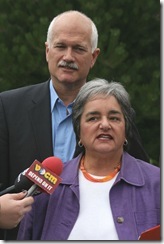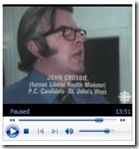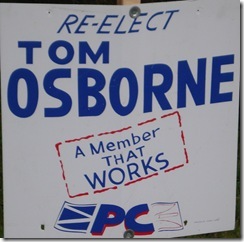or, the most expensive 15 codfish in the history of Newfoundland and Labrador.
Just how much did Rick Bouzan and George Nichol pee down the drain in fighting their conviction for violating fisheries regulations? Only their lawyer and their bankers know for sure but appeals all the way to the Court of Appeal don't come cheaply. The cost is even more burdensome when one considers that the constitutional basis for their original defence and the subsequent appeals could have been demolished by a second year undergraduate political science student equipped with a decent library and the stuff picked up in Poli Sci 2700 or whatever it is called these days.
For your weekend amusement and edification, following is the text of the decision in Bouzan and Nicols v. The Queen, delivered today by Mr. Justice Mercer of the appeals court on behalf of a three member panel that included Mercer, Mr. Justice Barry and Madame Justice Welsh.
For all you law students or aspiring lawyers out there, here is a sentence you never want to see in a judgment dismissing your appeal: "This argument is fallacious."
Ouch.
--text begins--
IN THE SUPREME COURT OF NEWFOUNDLAND AND LABRADOR COURT OF APPEAL
BETWEEN:
RICHARD BOUZAN AND
GEORGE NICHOL APPELLANTS
AND
HER MAJESTY THE QUEEN RESPONDENT
Coram: Welsh, Mercer and Barry, JJ.A.
Court Appealed From: Supreme Court of Newfoundland & Labrador, Trial Division, 200506T0157
Appeal Heard: June 22, 2007
Judgment Rendered: October 12, 2007
Reasons for Judgment by Mercer, J.A.
Concurred in by Welsh and Barry, JJ.A.
Counsel for the Appellants: T. James Bennett
Counsel for the Respondent: Paul B. Adams
Mercer, J.A.:
[1] The appellants were convicted of an offence under the Fisheries Act, R.S.C. 1985, c. F-14 arising from their participation in the groundfish food fishery. On appeal, as in the courts below, they challenge the constitutional authority of the Government of Canada to regulate the catching of fish for personal consumption within three miles of the coast of Newfoundland and Labrador going from headland to headland. The appellants assert that the constitutional authority in respect of such fishing is vested in the Province of Newfoundland and Labrador (Province).
Facts
[2] On September 20, 2004 the appellants were charged:
THAT they did on or about the 12th day of September, 2004, at or near Little Bay East, Fortune Bay, Newfoundland and Labrador, in NAFO Sub-Division 3Ps, being Canadian Fishery Waters, while engaged in the groundfish food fishery and fishing under the authority of an Atlantic Recreational Fishing License, failed to comply with a condition of that license to wit: did not tag codfish immediately after harvesting codfish, contrary to Section 22(7) of the Fishery General Regulations, thereby committing an offence punishable under section 78(a) of the Fisheries Act, R.S., c. F-14, as amended.
[3] Prior to trial the appellants gave notice they intended to raise a constitutional challenge. The constitutional questions, as amended, were as follows:
1. Does the Government of Canada have the jurisdiction to regulate the catching of groundfish, including cod, within three miles of the coast of Newfoundland and Labrador going from headland to headland?
2. If the Government of Canada has the jurisdiction to regulate the catching of groundfish, including cod, within three miles of the coast of Newfoundland and Labrador going from headland to headland, does that jurisdiction include the right to regulate the catching of groundfish, including cod, for personal consumption?
[4] Notice of the constitutional questions was given to the Attorney General of the Province. The Attorney General declined to intervene in the case.
[5] At trial the parties submitted an Agreed Statement of Facts which included the following:
- On September 12, 2004 the appellants held Atlantic Recreational Fishing licenses which had been issued by the Department of Fisheries and Oceans (Canada) for the recreational cod fishery (also referred to as the groundfish food fishery). The license conditions required that any cod caught was to “be tagged immediately after it is caught in the following manner: A non-used tag, issued with this license and valid for the NAFO Division being fished, must be affixed through the gill and mouth of each Atlantic cod. The tag must be properly sealed such that the tag cannot be re-opened or removed”. Fifteen such tags were issued with each license.
- On September 12, 2004 a fishing boat occupied by the appellants was inspected by fishery officers. That boat was then within 500 feet approximately of the shoreline of Fortune Bay near the community of Little Bay East which is in the Province. The appellants were found in possession of 29 codfish. Twelve of the codfish were affixed with tags issued to Mr. Nichol. The remaining codfish were not tagged. Fifteen of the codfish had been gutted and appeared to have been caught for some time.
- The fisheries officers told the appellants they were initiating an investigation, read them the standard police caution and advised them of their right to retain and instruct counsel. Both appellants stated they understood and did not wish to contact counsel at that time. Following that, and after being informed that all cod had to be tagged immediately after catch, Mr. Bouzan said “I didn’t read my license. It’s my own fault. I should have read the fine print”.
[6] No evidence other than the Agreement Statement of Facts was adduced at trial. The trial focused on the constitutional issues. The trial judge dismissed the constitutional challenge mounted by the appellants. He found that the Government of Canada has jurisdiction to regulate fishing within three miles of the coast of Newfoundland and Labrador and that jurisdiction extended to the regulation of the catching of cod for personal consumption. Given the clear admissions in the Agreed Statement of Facts the trial judge convicted the appellants. R. v. Nichol, [2005] N.J. No. 315.
[7] The appellants then appealed to the Supreme Court of Newfoundland and Labrador, Trial Division (Summary Conviction Appeal Court). The only issues argued by the appellants concerned the constitutional questions. The appeal was dismissed, the Summary Conviction Appeal judge stating:
[29] The trial judge concluded his judgment with this synopsis:
On entry into Confederation, Newfoundland assumed the same position as if Confederation had been achieved in 1867. As earlier discussed, this included recognition of exclusive jurisdiction over the fishery in the Federal Crown. There is no reason to distinguish between fishing for trade, barter or personal consumption.
[30] I am satisfied on the standard of correctness that applies to my review of the trial judge’s decision that his decision is right. He was alive to the arguments raised by the appellants and dealt with each in its turn. He concluded, and I agree with him, that the Government of Canada has exclusive jurisdiction in managing and controlling the Fisheries in all sea coast and inland waters of this province. I will explain further.
…..
[54] Richard Bouzan and George Nichol appealed their convictions in the Provincial Court for failing to comply with conditions in a recreational cod fishing licence requiring them to tag all cod fish immediately as they caught it. The appellants did not dispute the facts but challenged the validity of the legislation under which they were charged. In essence, the appellants claim that the Government of Canada has no jurisdiction to regulate catching fish for personal consumption within three miles of the coastline of Newfoundland and Labrador. The trial judge dismissed the appellants’ attack on the legislation.
[55] The trial judge did not err in his decision. There is no merit to the appellants’ claim, whether based on statute, the Terms of Union between Newfoundland and Canada, the case law, or the doctrine of Crown honour. The appeal is dismissed and the trial judge’s decision is affirmed in all aspects.
R. v. Nichol, [2006] N.J. No. 257, 25 C.E.L.R. (3d) 1 (NLTD)
Issues
[8] In this Court the appellants again raised the constitutional arguments which were analysed and rejected in the courts below. Leave was granted for the appeal pursuant to the provisions of s. 839(1) of the Criminal Code.
[9] The issues stated by the appellants in their factum were:
i. Do the Terms of Union create special status for the Province of Newfoundland and Labrador within Confederation?
ii. If so, does that special status derogate from Section 91 of the Constitution [Act], 1867, and in particular Sub-section 12, which deals with sea coast and inland fisheries?
iii. Do Statements on Questions Raised by the Newfoundland Delegation constitute a bilateral agreement between Newfoundland and the Government of Canada in addition to the Terms of Union?
iv. If so, does this agreement have any force and effect? If so, what is the effect of this agreement? Is it a warranty by the Government of Canada that survives signing of the Terms of Union?
v. If so, does this agreement provide a defence to the Appellants who have acknowledged that they were fishing for cod within three (3) miles of the coast of Newfoundland and Labrador?
[10] The respondent submitted that the appellants’ list of issues could be reduced to essentially one, namely:
“whether the Appeal Court erred in upholding the Trial Judge’s decision that the Government of Canada has the constitutional authority to regulate the recreational cod fishery in the territorial waters of Newfoundland and Labrador.”
[11] At the hearing before this Court counsel for the appellants agreed with that submission of the respondent. I will accordingly address the issue as so defined and then comment on the grounds of appeal.
Law and Analysis
[12] The appellants contend that under the constitutional arrangements whereby Newfoundland joined Canada in 1949 the Province’s legislative jurisdiction extends to control of the fisheries within three miles of its coast going from headland to headland. I am in substantial agreement with the thorough decisions of the courts below regarding that proposition and would therefore dismiss the appeal. The following summary of the constitutional position will explain the flaws in the appellants’ submissions.
[13] Under s. 91(12) of the Constitution Act, 1867 legislative jurisdiction over “Sea-coast and Inland Fisheries” was assigned to the Parliament of Canada. Prior to 1949 when Newfoundland joined Canada the extent of that jurisdiction had been considered by the Supreme Court of Canada and the Judicial Committee of the Privy Council.
[14] In Canada (Attorney General) v. Ontario (Attorney General) (sub nom. Reference re Provincial Fisheries), [1898] A.C. 700, the Privy Council considered the effect of s. 91(12) upon the allocation of Crown property between the provinces and the Dominion of Canada. It emphasized the distinction between proprietary rights and legislative jurisdiction and confirmed that the legislative jurisdiction conferred upon the Parliament of Canada would enable that legislature to seriously restrict the exercise of fishing rights. It stated:
22 Their Lordships are of opinion that the 91st section of the British North America Act did not convey to the Dominion of Canada any proprietary rights in relation to fisheries. Their Lordships have already noticed the distinction which must be borne in mind between rights of property and legislative jurisdiction. It was the latter only which was conferred under the heading, “Sea-Coast and Inland Fisheries” in s. 91. Whatever proprietary rights in relation to fisheries were previously vested in private individuals or in the provinces respectively remained untouched by that enactment. Whatever grants might previously have been lawfully made by the provinces in virtue of their proprietary rights could lawfully be made after that enactment came into force. At the same time, it must be remembered that the power to legislate in relation to fisheries does necessarily to a certain extent enable the Legislature so empowered to affect proprietary rights. An enactment, for example, prescribing the times of the year during which fishing is to be allowed, or the instruments which may be employed for the purpose (which it was admitted the Dominion Legislature was empowered to pass) might very seriously touch the exercise of proprietary rights, and the extent, character, and scope of such legislation is left entirely to the Dominion Legislature. The suggestion that the power might be abused so as to amount to a practical confiscation of property does not warrant the imposition by the Courts of any limit upon the absolute power of legislation conferred. The supreme legislative power in relation to any subject-matter is always capable of abuse, but it is not to be assumed that it will be improperly used; if it is, the only remedy is an appeal to those by whom the Legislature is elected. …
(pp. 712-713)
[15] That unequivocal position was affirmed by the Supreme Court of Canada in North v. Canada (1906), 37 S.C.R. 385 as follows:
Some questions were raised on this appeal by Mr. Wilson as to the legality of the condemnation on the ground that the fisheries along the coast belonged to the province and not to the Dominion and that the legislation for their protection should have been provincial and not Dominion. The simple answer to such objections is that the British North America Act, 1867, conferred upon the Dominion the exclusive power of legislation with respect to seacoast and inland fisheries and that the judgment of the Judicial Committee in the case of Attorney General of Canada v. Attorney-General of Ontario, determines affirmatively the exclusive right of the Dominion Parliament to make or authorize the making of regulations and restrictions respecting the fisheries of Canada.
(pp. 392-393)
[16] Several years later the Privy Council reiterated the Parliament of Canada’s jurisdiction in British Columbia (A.G.) v. Canada (A.G.) (sub nom. B.C. Fisheries Reference) (1913), 15 D.L.R. 308 in which it stated:
… By sec. 91 of the British North America Act, 1867, the exclusive legislative authority of the Parliament of Canada extends to all matters coming within (amongst other things) “Sea Coast and Inland Fisheries.” The meaning of this provision was considered by this Board in the case of Attorney-General for the Dominion v. Attorney-General for the Provinces, [1898] A.C. 700, and it was held that it does not confer on the Dominion any rights of property, but that it does confer an exclusive right on the Dominion to make restrictions or limitations by which public rights of fishing are controlled, and on this exclusive right provincial legislation cannot trench. It recognized that the province retains a right to dispose of any fisheries to the property in which the province has a legal title, so far as the mode of such disposal is consistent with the Dominion right to regulation, but it held that, even in the case where proprietary rights remain with the province, the subject-matter may be of such a character that the exclusive power of the Dominion to legislate in regard to fisheries may restrict the free exercise of provincial rights. Accordingly, it sustained the right of the Dominion to control the methods and season of fishing and to impose a tax in the nature of license duty as a condition of the right to fish, even in cases in which the property in the fishery originally was or still is in the provincial Government.
… when, by sec. 91, sea coast and inland fisheries were placed under the exclusive legislative authority of the Dominion Parliament, there was in the case of the fishing in tidal waters nothing left within the domain of the provincial legislature. The right being a public one, all that could be done was to regulate its exercise, and the exclusive power of regulation was placed in the Dominion Parliament. …
Their Lordships have already expressed their opinion that the right of fishing in the sea is a right of the public in general which does not depend on any proprietary title, and that the Dominion has the exclusive right of legislating with regard to it. …
(pp. 317-318)
[17] It is clear therefore that exclusive federal legislative jurisdiction over fisheries regulation was well established prior to 1949. It has continually been affirmed in recent years. For example, in Ward v. Canada (A.G.), [2002] 1 S.C.R. 569, a case arising in this Province, the Supreme Court of Canada considered the validity of federal regulations prohibiting the sale or trade of the pelts of young seals. In upholding the regulations McLachlin C.J. stated:
34 First, the preponderance of authority suggests that the fisheries power is not confined to conservation, nor to pre-sale activities, but extends more broadly to maintenance and preservation of the fishery as a whole, including its economic value. In The Queen v. Robertson (1882), 6 S.C.R. 52, Ritchie C.J. described the fisheries power as extending “to subjects affecting the fisheries generally, tending to their regulation, protection and preservation”. Accordingly, Parliament’s power extended to “all such general laws as enure as well to the benefit of the owners of the fisheries as to the public at large, who are interested in the fisheries as a source of national or provincial wealth” (pp. 120-21).
…..
36 The theme that the fisheries power refers to the resource was affirmed by this Court, per Laskin C.J. (dissenting, but not on this point) in Interprovincial Co-Operatives Ltd. v. The Queen, [1976] 1 S.C.R. 477, who wrote, at p. 495, that the federal fisheries power “is concerned with the protection and preservation of fisheries as a public resource”, extending even to the “suppression of an owner’s right of utilization”.
…..
41 These cases put beyond doubt that the fisheries power includes not only conservation and protection, but also the general “regulation” of the fisheries, including their management and control. They recognize that “fisheries” under s. 91(12) of the Constitution Act, 1867 refers to the fisheries as a resource; “a source of national or provincial wealth” (Robertson, supra, at p. 121); a “common property resource” to be managed for the good of all Canadians (Comeau’s Sea Foods, supra, at para. 37). The fisheries resource includes the animals that inhabit the seas. But it also embraces commercial and economic interests, aboriginal rights and interests, and the public interest in sport and recreation.
[18] The appellants agreed that as a general proposition the Parliament of Canada has exclusive legislative jurisdiction over the fisheries. They argued that the arrangements governing Newfoundland’s entry into Canada created an exception to the general proposition with respect to the fishery within three miles of the coast of the Province.
[19] Newfoundland joined Canada in 1949 pursuant to negotiated Terms of Union which were then enacted by the Parliament of the United Kingdom – U.K. 12 & 13 Geo. VI., c. 22 and by the Parliament of Canada “An Act to approve the Terms of Union of Newfoundland with Canada”, 1949 (Can.) 1st Sess., c. 1. The provisions of the Terms of Union relevant to this matter include Terms 3, 18(1) and (2), 22 and 31(g).
[20] Term 3 states that the statutes comprising the Canadian Constitution apply to Newfoundland as if it had been one of the original provinces, except insofar as the same are varied by the Terms of Union:
3. The British North America Acts, 1867 to 1946, shall apply to the Province of Newfoundland in the same way, and to the like extent as they apply to the provinces heretofore comprised in Canada, as if the Province of Newfoundland had been one of the provinces originally united, except in so far as varied by these Terms and except such provisions as are in terms made or by reasonable intendment may be held to be specially applicable to or only to affect one or more and not all of the provinces originally united.
[21] Term 18 addresses the continuation of laws. Those which were in force in Newfoundland immediately prior to its union with Canada continued in force subject to repeal or alteration either by the Parliament of Canada or the legislature of the Province according to their respective authority under the Canadian Constitution:
18. (1) Subject to these Terms, all laws in force in Newfoundland at or immediately prior to the date of Union shall continue therein as if the Union had not been made, subject nevertheless to be repealed, abolished, or altered by the Parliament of Canada or by the Legislature of the Province of Newfoundland according to the authority of the Parliament or of the Legislature under the British North America Acts, 1867 to 1946, and all orders, rules, and regulations made under any such laws shall likewise continue, subject to be revoked or amended by the body or person that made such orders, rules, or regulations or the body or person that has power to make such orders, rules, or regulations after the date of Union, according to their respective authority under the British North America Acts, 1867 to 1946.
(2) Statutes of the Parliament of Canada in force at the date of Union, or any part thereof, shall come into force in the Province of Newfoundland on a day or days to be fixed by Act of the Parliament of Canada or by proclamation of the Governor General in Council issued from time to time, and any such proclamation may provide for the repeal of any of the laws of Newfoundland that
(a) are of general application;
(b) relate to the same subject-matter as the statute or part thereof so proclaimed; and
(c) could be repealed by the Parliament of Canada under paragraph one of this Term.
…..
[22] Term 22 was the only Term under the heading “Fisheries”. It covered a discrete group of Newfoundland statutes which concerned the export marketing of salted fish. It provided for the continuation of those statutes for at least five years, unless the provincial cabinet requested an earlier repeal or alteration:
22. (1) In this Term, the expression “Fisheries Laws” means the Act No. 11 of 1936, entitled “An Act for the creation of the Newfoundland Fisheries Board”, the Act No. 14 of 1936, entitled “An Act to Prevent the Export of Fish Without Licence”, the Act No. 32 of 1936, entitled “An Act to Amend the Newfoundland Fisheries Board Act (No. 11 of 1936)”, the Act No. 37 of 1938, entitled “An Act Further to Amend the Newfoundland Fisheries Board Act, 1936”, the Act No. 10 of 1942, entitled “An Act Respecting Permits for the Exportation of Salt Fish”, the Act No. 39 of 1943, entitled “An Act Further to Amend the Newfoundland Fisheries Board Act, 1936”, the Act No. 16 of 1944, entitled “An Act Further to Amend the Newfoundland Fisheries Board Acts, 1936-38”, and the Act No. 42 of 1944, entitled “An Act Further to Amend the Newfoundland Fisheries Board Act, 1936”, in so far as they relate to the export marketing of salted fish from Newfoundland to other countries or to any provinces of Canada.
(2) Subject to this Term, all Fisheries Laws and all orders, rules, and regulations made thereunder shall continue in force in the Province of Newfoundland as if the Union had not been made, for a period of five years from the date of Union and thereafter until the Parliament of Canada otherwise provides, and shall continue to be administered by the Newfoundland Fisheries Board; and the costs involved in the maintenance of the Board and the administration of the Fisheries Laws shall be borne by the Government of Canada.
(3) The powers, authorities, and functions vested in or imposed on the Governor in Commission or the Commissioner for Natural Resources under any of the Fisheries Laws shall after the date of Union respectively be vested in or imposed on the Governor General in Council and the Minister of Fisheries of Canada or such other Minister as the Governor General in Council may designate.
(4) Any of the Fisheries Laws may be repealed or altered at any time within the period of five years from the date of Union by the Parliament of Canada with the consent of the Lieutenant-Governor in Council of the Province of Newfoundland and all orders, rules, and regulations made under the authority of any Fisheries Laws may be revoked or altered by the body or person that made them or, in relation to matters to which paragraph three of this Term applies, by the body or person that under the said paragraph three has power to make such orders, rules, or regulations under the Fisheries Laws after the date of Union.
…..
(6) Terms eleven, twelve, thirteen and eighteen are subject to this Term.
…..
[23] Term 31, which provided for the assumption by the Government of Canada of certain public services, works and property, expressly referred to the fisheries:
31. At the date of Union, or as soon thereafter as practicable, Canada will take over the following services and will as from the date of Union relieve the Province of Newfoundland of the public costs incurred in respect of each service taken over, namely,
…..
(g) protection and encouragement of fisheries and operation of bait services; …
[24] The effect of the Terms of Union upon legislative jurisdiction over the fisheries was addressed by this Court in Johnson v. Seabright et al. (1979), 107 D.L.R. (3d) 749 (affirmed in Moore v. Johnson, [1982] 1 S.C.R. 115). That case considered whether a Newfoundland statutory provision prohibiting the killing of seals on Sunday had been repealed or abolished by the passage of a regulation pursuant to federal fisheries legislation. The Newfoundland statute was one in force in Newfoundland prior to its union with Canada. In declaring that statute to have been repealed the Court unanimously held that fisheries is within the sole legislative jurisdiction of the Parliament of Canada. Gushue J.A. noted the effect of Term 18 of the Terms of Union and squarely addressed the legislative jurisdiction over fisheries as follows:
… the Seal Fishery Act encompasses various fields, both federal and provincial, but there can be no doubt that the purpose of the Act generally was to regulate the prosecution of the seal fishery. … It was therefore a fisheries regulation, and the regulation of fisheries, both sea coast and inland, came and comes under the aegis of the federal Government. …
(p. 754)
…..
To quote Rand, J., in the Bowater case, supra, at p. 98 D.L.R., p. 639 S.C.R.:
The legislative result of the Union has been to transfer to the field of the Dominion those provisions of law which relate to matters attributed in the constitutional structure to the Dominion;… .
Thus, because fisheries was a field solely and exclusively within the jurisdiction of the federal Parliament, that body – and that body only – had the authority to repeal, abolish or alter s. 15 of the Seal Fishery Act. …
(p. 755)
…..
I agree that by the proclaiming into law of the Fisheries Act in May, 1958, and the subsequent making of the Seal Protection Regulations by the Governor-General in Council pursuant to that Act, the Parliament of Canada exercised its exclusive jurisdiction in the field of fisheries and, by doing so, occupied the field of fisheries regulation and management in Newfoundland, thereby necessarily “repealing, abolishing or altering” all Newfoundland laws hitherto in existence for that purpose. …
… It is clear from Term 18 of the “Terms of Union” that the only body competent to enact legislation in respect of matters involving the regulation of fisheries is the Parliament of Canada. …
(p. 757)
[25] In seeking to distinguish Johnson v. Seabright the appellants do not confine their analysis to the Terms of Union and the Constitution Act. They also refer to a document which preceded the enactment of the Terms of Union. On December 11, 1948 the Prime Minister of Canada wrote the Chairman of the Newfoundland delegation involved in the negotiation of the Terms of Union. That letter, to which was attached a lengthier memorandum, stated:
During the course of our negotiations covering the final terms and arrangements for the union of Newfoundland with Canada a number of questions concerning Government policy were raised by your delegation and answered by the Canadian Government. In addition a number of temporary administrative arrangements were settled in order to facilitate the union.
It would not seem fitting to include in formal terms of union matters of this kind, since they are scarcely of a constitutional nature. I am therefore sending you the enclosed memorandum covering these various items. While these will not form part of the Terms of Union, they contain statements of the policy and intentions of this Government if union is made effective by the approval of the Parliament of Canada and the Government of Newfoundland and confirmed by the Parliament of the United Kingdom.
[26] I observe that this letter noted that the memorandum attached addressed matters of (Canadian) government policy and temporary administrative arrangements. The Prime Minister expressly disclaimed that the matters covered in the memorandum were of a constitutional nature. The memorandum covered a wide range of items such as imports of essential goods, passports, hospitalization of veterans and enrichment of flour. It included the following:
(iv) CONTINUATION OF LAWS
The Canadian Government will consult with the appropriate Newfoundland authorities with regard to the timing of the application of federal statutes or the timing of the repeal of Newfoundland statutes, where the provincial authorities feel that serious problems are involved requiring consultation with the federal authorities.
This will be a matter for specific discussion between the appropriate representatives of the two governments from time to time.
…..
(xii) FISHERIES
1. Trawling
Newfoundland trawlers will be permitted to fish (as they have been doing) to the three-mile limit off the coasts of Newfoundland, and an amendment to the Fisheries Act, 1932, will be introduced for this purpose.
It is understood that the policy as to trawler licensing in Newfoundland will be based on securing the maximum efficiency for the province’s fishing industry and welfare for its shore communities.
With respect to the establishment of territorial waters it is our understanding that the “headland to headland” rule, as it now applies to Newfoundland, will continue to apply.
2. Prohibition of Export of Bait Fishes
.....
3. Licensing of Premises to Pack Fish
(including Filleting and Freezing Plants)
…..
4. Power of Newfoundland Fisheries Board to Set
Quotas for Fish for Export
…..
5. Market Representatives
…..
6. Newfoundland Fish Export Tax
…..
7. Power of Newfoundland Fisheries Board to Negotiate Contracts
…..
8. Fish Wrappers and Packages
…..
9. Inspection Fees on Export
…..
10. Tariff Agreements
…..
11. Bait Service
…..
“Statements on Questions Raised by the Newfoundland Delegation during the Negotiations for the Union of Newfoundland with Canada”
[27] The appellants, referring specifically to para. (xii) thereof, contend that this 1948 memorandum constituted a bilateral agreement between Newfoundland and the Government of Canada pursuant to which the Province has the sole legislative jurisdiction over fisheries within the three mile territorial sea (as it was in 1949). They further refer to the 1948 memorandum in support of their contention that under the Terms of Union the Province “retained” jurisdiction over such fisheries except that pertaining to the export of salted fish.
[28] The appellants stated their position in para. 38 of their factum as follows:
The Appellants maintain that the Prime Minister of Canada made a promise in a memorandum titled Statements on Questions Raised by the Newfoundland Delegation. That promise conceded that Newfoundland would continue to exercise jurisdiction over a three (3) mile territorial sea as it had done prior to entering Confederation. The Fisheries Act, 1932 was amended in 1952 regarding trawlers, thereby providing proof positive of the promise made by Prime Minister St. Laurent as well as partial performance of that promise. The Federal Fisheries Act was again amended in 1969 and by that amendment jurisdiction to the three (3) mile limit was removed and breaking that promise.
[29] In my view the actual wording of paragraph (xii) of the 1948 memorandum cannot on any reasonable interpretation support the appellants’ position. The express language does not mention that Newfoundland is to have jurisdiction over the fisheries within the three mile territorial sea. Considering the significance of the fishery and that the paragraph provides clear guidance on other aspects of the fishery it seems implausible that Newfoundland’s jurisdiction, as claimed by the appellants, would not be more clearly acknowledged. I observe that paragraph xii(i) is headed “Trawling” and its text discusses only that aspect of the fishery and the continued application of the “headland to headland” rule respecting territorial waters. The most reasonable interpretation of that paragraph, read in context, is that it stated the intention of the Government of Canada on how federal jurisdiction would be exercised if Newfoundland were to join Canada. It specifically noted that federal legislation would be required to effect the stated policy that Newfoundland trawlers would be permitted to fish to the three mile limit. The 1948 memorandum does not support any suggestion that Newfoundland, as a province, was to have legislative jurisdiction over fisheries in the territorial sea.
[30] I further note that the appellants’ submissions fail to consider the effect of the Prime Minister’s covering letter – see para. 25 above – upon interpretation of the 1948 memorandum.
[31] I conclude that the 1948 memorandum does not have the constitutional effect claimed by the appellants. It did not alter the distribution of legislative jurisdiction and affords no principled basis for overturning Johnson v. Seabright.
[32] I will now comment briefly in order on the nine grounds of appeal stated in the appellants’ factum.
Ground 1 - That the Learned Appeal Court Judge erred in the proper interpretation of the Terms of Union of the Dominion of Newfoundland with the Dominion of Canada in that he placed undue emphasis on Term 18 and insufficient emphasis on Term 22. Term 22 deals with the fishery and serves to cut down the provisions of Term 18 as it applies to the fishery.
Ground 2 - That the Learned Appeal Court Judge erred in ruling that the Dominion of Newfoundland transferred jurisdiction of the entire fishery to the Dominion of Canada, when in fact, Term 22 clearly defines Fisheries Laws as pertaining to the salt fishery only.
[33] The appellants argue that Term 22 serves to restrict the application of Term 18 with respect to the fisheries. They state:
… If Term 18 mandates that all laws in force in Newfoundland continue in force, why is it then necessary for Term 22(2) to mandate that all fisheries laws continue in force for 5 years and thereafter until the Parliament of Canada provides otherwise. The only way that Term 18 and Term 22 can logically coexist is if Newfoundland retained jurisdiction over its fisheries but for the export market of salted fish from Newfoundland to other countries and to any provinces of Canada.
[34] This argument is fallacious. Term 18 and Term 22 are entirely consistent with exclusive federal legislative jurisdiction over the fisheries. Term 18 addressed the continuation of all laws in force in Newfoundland at the date of Union and their repeal or amendment by either the federal parliament or provincial legislature in accordance with the established distribution of powers under the Canadian Constitution. There was no assurance in Term 18 that such laws would not be repealed or amended immediately following union with Canada. Term 22 provided that assurance with respect to a defined group of statutes concerning the export marketing of salted fish. These statutes were to continue in force for a minimum of five years unless the Newfoundland cabinet sought their earlier alteration or repeal. Term 22 therefore provided a limited exception to Term 18.
Ground 3 - That the Learned Appeal Court Judge erred in ruling that the Doctrine of Crown Honour did not apply to the Appellants because they are not indigenous people. In fact the Doctrine of Crown Honour is a common law Doctrine, which predates the Dominion of Canada even coming into existence by hundreds of years.
[35] Under this ground the appellants emphasized the 1948 memorandum discussed above. Federal fisheries legislation was amended in 1952 to permit Newfoundland trawlers to fish within three miles of the coast. The appellants contended that a statutory amendment in 1969 undid this preferential treatment accorded to Newfoundland trawlers thereby breaking the promise made in 1948. It is in that context that the doctrine of Crown honour was asserted.
[36] There cannot be resort to the doctrine of Crown honour in these circumstances. The 1948 memorandum was clearly a statement of the intended policy of the Government of Canada on various matters within federal jurisdiction including certain fisheries matters. There was no assurance that such policy would continue in perpetuity. It is of the very nature of government policy in such matters that it may change over time. As explained above the 1948 memorandum did not alter the allocation of legislative power over fisheries under the Constitution.
[37] Under this ground it was further stated that Newfoundland, prior to union with Canada, had exercised jurisdiction over a three mile territorial sea. The appellants then maintained “that any territory or jurisdiction not ceded to the Federal Government logically remains with the province”. I offer two comments on this proposition. Firstly, whether territory belongs to the province does not assist the appellants. It is well established that there is a distinction between property rights and legislative jurisdiction and that legislative jurisdiction over fisheries conferred on the Parliament of Canada may be exercised in respect of property vested in the Province – see B.C. Fisheries Reference. Secondly, the statement that jurisdiction not ceded to the Federal Government remains with the Province is inaccurate. It ignores the plain language of Term 3 of the Terms of Union which provided that the Canadian Constitution applies to Newfoundland in the same manner as all other provinces, except as varied by the Terms of Union. Under the Constitution Act, 1867 the legislative jurisdiction over fisheries was assigned to the Parliament of Canada. There is nothing in the Terms of Union at variance with that assignment of exclusive legislative jurisdiction except for the transitional provisions in Term 22.
Ground 4 - That the Learned Appeal Court Judge erred in relying upon the conclusion of the Trial Court judge that Newfoundland assumed the same position on entry into Canada as if Confederation had been achieved in 1867. Term 3 of the Terms of Union clearly establishes a special status for the Dominion of Newfoundland, that being equal to the nine provinces of Canada except as modified by the Terms of Union.
[38] The appellants’ challenge in this regard does not advance their position. The Appeal Court judge at paras 29-30 – see para. 7 above – accepted that upon entry into Canada Newfoundland was subject to the Canadian Constitution in the same manner as all other provinces. He did not add the qualification stated in Term 3 that the foregoing was subject to such variance as was contained in the Terms of Union. That qualification is only important in the context of this case if the appellants could have established that the Terms of Union varied legislative jurisdiction over the fisheries and conferred legislative jurisdiction upon the Province within the three mile territorial sea. The appellants’ arguments have not persuaded me that the Terms of Union have varied the legislative jurisdiction over fisheries in that manner. The only variance of note was that in Term 22, providing for the short-term continuance of statutes relating to the export marketing of salted fish. The Terms of Union do not by their express terms or necessary inference confer upon Newfoundland legislative jurisdiction over fisheries regulation.
[39] Under this ground of appeal the appellants also observed that certain statutory restrictions on salmon fishing which applied to other eastern provinces were not amended to extend to this Province. This was suggested to be an acknowledgement by the Government of Canada that it had no jurisdiction to legislate in respect of fisheries within the three mile territorial sea off the Province. There is no merit to that position. No authority was cited, nor am I aware of any, in support of the proposition that the Parliament of Canada must legislate in like manner for each province in respect of fisheries regulations. There may obviously be differing historical, social or economic reasons why fisheries regulations may vary from one region or province to another. The absence of particular legislation in respect of this Province cannot at law be taken as an acknowledgement of lack of jurisdiction.
Ground 5 – That the Learned Appeal Court Judge erred in relying upon cases decided by Canadian Courts prior to the entry of Newfoundland into Confederation. Specifically, the other nine provinces joined the Dominion of Canada as either colonies or as territories and enjoyed no international personality at the time that they joined Confederation. Newfoundland, on the other hand, joined Canada as a Dominion. It had already achieved Dominion status and authority. Therefore, its international boundaries including its boundary with the Dominion of Canada in Labrador and its three (3) mile territorial sea had already been established in accordance with international law in the same manner as all other Dominions of the Commonwealth, including Canada.
[40] The appellants’ contentions under this ground cannot be accepted. That Newfoundland, immediately prior to joining Canada, had Dominion status, certain international boundaries and a territorial sea, is, in the context of this appeal, a “red herring”. This appeal is about the distribution of legislative jurisdiction under the Canadian Constitution. When Newfoundland joined Canada it accepted in Term 3 of the Terms of Union that the existing Canadian Constitution, including the key provisions pertaining to legislative jurisdiction, applied to it as to all other provinces, except as varied by the Terms of Union. The only variation in respect of fisheries jurisdiction cited by the appellants was that in Term 22. As discussed above, the variation in Term 22 was both limited in scope and short term in duration. It does not assist the appellants.
[41] I specifically reject the appellants’ contention that case law pre-dating Newfoundland’s entry into Canada ought not to be considered. In 1949 Newfoundland adhered to the existing Canadian Constitution with its developed jurisprudence. That jurisprudence applied to Newfoundland in accordance with Term 3 of the Terms of Union.
[42] The appellants cited the decision of this Court in Reference re: Mineral and Other Natural Resources of the Continental Shelf (1983), 145 D.L.R. (3d) 9 respecting proprietary rights to the bed and subsoil of the 1949 territorial waters of Newfoundland. They argued that ownership of the fishery of the territorial sea therefore belonged to the Province. That argument ignores the clear jurisprudence that federal legislative jurisdiction over the fisheries is not ousted by the existence of provincial proprietary rights – see for example, B.C. Fisheries Reference.
Ground 6 – That the Learned Appeal Court Judge erred in relying upon Johnson v. Seabright and Ward v. Canada as the impugned activity is distinguishable in two respects. First of all, the Courts in Johnson and Ward dealt with activities, which took place outside of the three (3) mile territorial sea surrounding Newfoundland and Labrador. Secondly, they dealt with commercial harvesting of sea mammals whereas the instant case deals with recreational fishing for personal consumption within the three (3) mile territorial sea surrounding Newfoundland and Labrador.
[43] The appellants seek to distinguish Johnson v. Seabright and Ward v. Canada principally on the basis that neither concerned the fishery within the territorial sea. As explained above however there is no basis to conclude that the exclusive federal legislative jurisdiction over fisheries was restricted by the Terms of Union in respect of territorial waters off Newfoundland. The principles enunciated in Johnson v. Seabright and Ward v. Canada apply equally in respect of those territorial waters as they do beyond such waters.
Ground 7 – That the Learned Appeal Court Judge erred in ruling that Newfoundland was not particularly bothered by federal control over a fishery within a three (3) mile territorial sea as the provincial government has not challenged federal legislative authority to do so. The Appellants maintain that acquiescence of their provincial government in protecting their individual rights is not sufficient to cause the loss of those rights. Furthermore, the Province of Newfoundland and Labrador has successfully challenged the jurisdiction of the Government of Canada regarding the ownership for sub sea resources, extending three (3) miles out to sea from the low water mark of the coastline of the province in Reference Re Minerals and Other Naturals Resources of the Continental Shelf.
[44] The statement in question by the Appeal Court judge was not central to his disposition of the case. It was obiter.
[45] Furthermore the statement that Newfoundland was not “particularly bothered” is quoted out of context. It was contained within a review by the Appeal Court Judge of the Terms of Union as follows:
[36] The Terms of Union expressly acknowledge Federal jurisdiction over Fisheries as I have just demonstrated. But there is, aside from express acknowledgement, a tacit recognition which is just as compelling: Newfoundland agreed to the Terms of Union with Canada and Term 22 in particular. Term 22 defers to Federal jurisdiction over Fisheries and it acknowledges that Newfoundland was content with the arrangement agreed upon. Implicit in the Term 22 is a recognition that the Government of Canada held the residual authority over Fisheries and Newfoundland was simply retaining what it could of the sovereign position that it had once held in Fisheries to ease the transition to the new management regime.
[37] Newfoundland was understandably concerned about the immediate impact of Confederation on its most important industry in the present knowledge that the industry would pass to Federal control when the Union was finalized. It sought and received from the residual authority – the Government of Canada – assurances that the industry would be protected until the Federal government developed the infrastructure and legislative base to avoid calamity in the fishery.
[38] This is not the stance of government that believed it was retaining control of the fishery. Rather it is consistent with what it had agreed to when it negotiated Newfoundland’s entry into Confederation: give over control of the fishery (and in many other areas it had formerly controlled) to the Federal government in the bargain to join the Union. It is not as though Newfoundland was particularly bothered by its choice. After all, the cost of managing the fishery was a burden to Newfoundland. The cost of operating the Fisheries Board was the main part of that burden and Newfoundland was happy to pass that cost to the Government of Canada under Term 22(2).
(emphasis added)
[46] I find no error in the foregoing analysis of the Appeal Court Judge.
[47] The reference to provincial acquiescence followed the above quoted paragraphs and noted the absence of provincial legislation asserting control over the fisheries and the stance adopted by the Attorney General of the Province in Johnson v. Seabright and in this case. No error has been shown in the statements of the Appeal Court Judge on those points.
[48] The decision of the Attorney General of the Province not to intervene in this case has not affected my view respecting legislative jurisdiction over the fisheries.
Ground 8 – That the Learned Appeal Court Judge erred in finding no evidence of broken promises when the Government of Canada first amended the Federal Fisheries Act to recognize a three (3) mile limit for Newfoundland trawlers and then, without consent, further amended the Federal Fisheries Act to remove that provision which created special status for Newfoundland trawlers.
[49] This ground is a recasting of the submission arising from the 1948 memorandum. The appellants argue that amendments to federal fisheries legislation should be treated as “either a bilateral agreement between the Dominion of Newfoundland and the Dominion of Canada, as a promise made by the Crown of the Dominion of Canada, which must be honoured, or as part of the Constitution of the Nation as it pertains to the Province of Newfoundland and Labrador”. For the reasons explained in para. 29 above the 1948 memorandum did not alter federal legislative jurisdiction over fisheries. A fortiori legislation which implemented part of that memorandum could not have that effect.
Ground 9 – That the Learned Appeal Court Judge erred in finding that the Appellants have not identified themselves or any other Newfoundland group as groups to whom the Government of Canada owes a fiduciary duty in respect of the fisheries, when in fact they claim that all residents of Newfoundland and Labrador are that group.
[50] In the contested passage the Appeal Court Judge was responding to the appellants’ invocation of the doctrine of Crown honour, and their citation of cases which discussed that doctrine in the context of aboriginal and treaty rights.
[51] In view of my conclusions respecting the distribution of legislative jurisdiction over the fishery it is unnecessary to delve into the doctrine of Crown honour. However, the appellants’ submissions did not establish any basis for the alleged fiduciary duty.
Disposition
[52] For the reasons stated above, I would dismiss the appeal.
_________________________
K.J. Mercer, J.A.
I concur: _______________________
B.G. Welsh, J.A.
I concur: ________________________
L.J. Barry, J.A.
-srbp-
![scene-480[3]](http://lh4.google.com/horridlm/RwaF-lRLl8I/AAAAAAAAAoM/Q7DqruCKZVk/scene-480%5B3%5D_thumb%5B2%5D.jpg)













